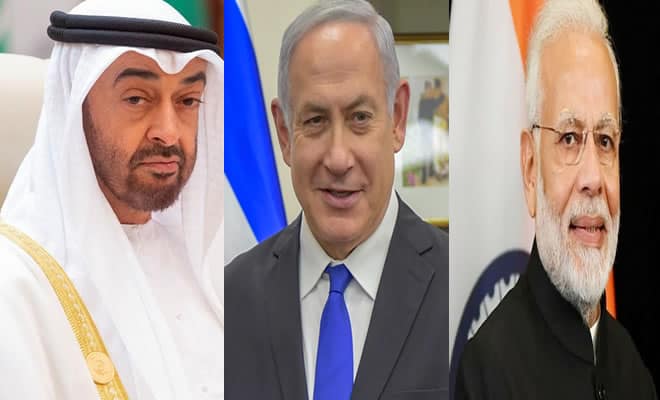The UAE-Israel Peace Agreement and what it means for India: An insight into the Abraham Accord

Last updated on February 15th, 2023 at 12:40 pm
Long time foes United Arab Emirates and Israel agreed to enter into a historic peace agreement on August 13, 2020. The agreement which has been named the Abraham Accord is brokered by US President Donald Trump’s administration, and is undoubtedly the deal of century which can alter the course of geopolitics in the Middle East region and as a chain reaction in entire world. If the UAE and Israel, who are strong allies of the United States of America but have been at opposing ends for decades, officially sign this peace agreement the whole geopolitics situation of the region is bound to change. Israel hasn’t been recognized by any Arab country but under the Abraham Accord will be formally recognized by the UAE. Israel too will halt its plans of annexing the Jewish settlements in the Palestine occupied West Bank region. The UAE would be the first Gulf country and the third Arab country to formally recognize Israel. Egypt had normalized its relations with Israel in 1979 and Jordon did in 1994. The official signing of peace agreement between UAE and Israel is scheduled to be in the White House on September 15, 2020.
HUGE breakthrough today! Historic Peace Agreement between our two GREAT friends, Israel and the United Arab Emirates!
— Donald J. Trump (@realDonaldTrump) August 13, 2020
India too has welcomed the historic peace deal between its strong allies UAE and Israel. Both the nations are strong strategic partners of India and the normalization between the two can be very beneficial for India in a long run. The situation in West Asia is bound to change positively and the nation that is most to benefit strategically is India. Indian Ministry of External Affairs spokesperson Anurag Srivastava said after peace agreement announcement, “India has consistently supported peace, stability and development in West Asia, which is its extended neighbourhood. In that context, we welcome the full normalization of ties between UAE and Israel.”
After UAE it is in high probability that many other Arab countries will join the suit and normalize the relationship with Israel. India too has stakes in this agreement as the country has deep interests in the region in important sectors such as energy supplies and the large number of expats working in Arab countries. But many countries including Iran have condemned the peace agreement. India needs to watch the interests and its moves in these nations who view the UAE-Israel peace deal as a security threat. India however has relayed its maintaining the earlier stand of two-state establishment in the Israel-Palestine region, reaffirming its stand for “Palestinian cause”.
India is one of the few countries that is believed to benefit the most from the Abraham Accord as both Israel and UAE are close allies of India. India’s relations with Arab nations are on multi-levels – historically, civilization and mutual benefit. The Gulf region provides a lot of jobs and remittances to the Indians working in these countries. Prime Minister Narendra Modi has worked the country’s foreign policy to become pro-West Asia. Interestingly all the major powers and stakeholders in the region, though are at crosshairs with each other, are keen to maintain good relations with India – be it the Jewish power Israel, the Sunni power Saudi Arabia or the Shia power Iran. But recent growing closeness to US, India is distancing itself from Iran. Also with Iran cozying up with China, India needs strong allies in the region. The UAE-Israel Peace Agreement provides that safe haven for India. Furthermore, Turkey has found a close ally in Pakistan and is challenging India on Islamism. On this account India needs major support from Arab countries who have the maximum say in Muslim affairs globally. Crown Price of Saudi Arabia Mohammed bin Salman and PM Modi hold very good relationship, so the benefits India will achieve from this deal will only grow exponentially.
Read: Health Ministry issues fresh guidelines for patients recovering from COVID-19



